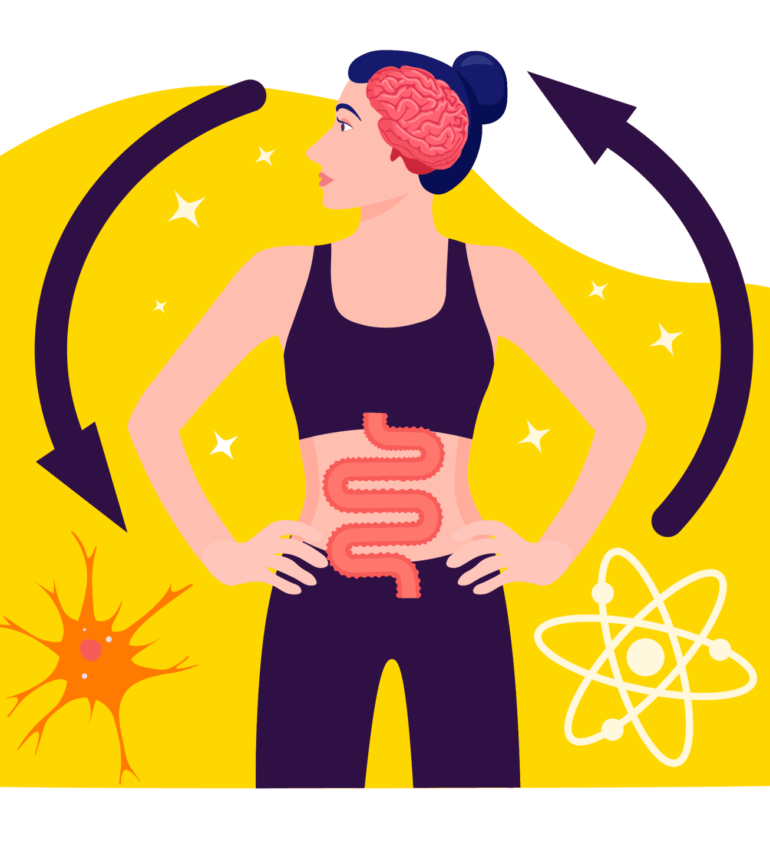If you’ve ever felt butterflies in your stomach before a big event or lost your appetite when stressed, you’ve experienced the gut-brain connection in action. But for some, this connection becomes a chronic issue, where anxiety fuels digestive distress, and gut symptoms trigger more anxiety, forming a frustrating cycle.
Let us understand how the brain-gut connection works:
- From Brain to Gut: When you’re anxious or stressed, your brain signals the gut, leading to changes in digestion, motility, and sensitivity. This might cause symptoms like nausea, bloating, diarrhoea, or constipation.
- From Gut to Brain: Your gut is home to the enteric nervous system (ENS) — often called the second brain. It produces neurotransmitters like serotonin and GABA, which impact your mood and emotional state. A healthy gut can promote mental well-being, while gut imbalances (like dysbiosis) may contribute to anxiety and depression.
This means that mental stress can manifest as gut discomfort — and gut issues can fuel anxiety, creating a vicious cycle.
In this blog post, we’ll explore how anxiety impacts your gut, how to identify if your symptoms are anxiety-driven, and what you can do to calm both your mind and belly. We’ll also include Ayurvedic insights and tips on when to seek professional help.
🤔 What Is the Gut-Brain Connection?
The gut-brain connection refers to the constant, two-way communication between your brain and digestive system — a relationship that is both physical and chemical. This is facilitated by the gut-brain axis, which includes the vagus nerve, neurotransmitters, hormones, and immune pathways.
🔄 It’s a Bi-Directional Pathway
😟 How Anxiety Leads to Gut Symptoms
When you’re anxious, your brain enters a ‘fight or flight’ state, releasing stress hormones like cortisol and adrenaline. These hormones signal the digestive system to slow down or even shut off temporarily, causing:
- Sluggish digestion, leading to bloating, gas, or discomfort
- Increased gut sensitivity, where normal sensations feel painful (visceral hypersensitivity)
- Changes in gut motility, resulting in either constipation or diarrhoea
- Suppressed digestive enzyme production, making food harder to break down
- Change the balance of bacteria in the gut and increase intestinal permeability — commonly called “leaky gut” — which further aggravates symptoms.
🧬 Does Gut Microbiota Affect Mental State?
Yes — and increasingly, science supports this! Your gut is home to trillions of microbes, collectively known as the gut microbiota, which play a key role in producing neurotransmitters like serotonin, dopamine, and GABA — all essential for mood regulation. Interestingly, about 90% of serotonin, the mood-regulating neurotransmitter, is made in the gut!
These microbes also interact with the immune system, influence inflammation, and affect how the brain responds to stress. An imbalance in gut flora (dysbiosis) can lead to increased anxiety, depression, and stress reactivity.
- People with anxiety disorders often show lower microbial diversity and lower levels of beneficial bacteria.
- Gut microbiota can even influence how the hypothalamic-pituitary-adrenal (HPA) axis — your stress response system — functions.
🚫 Signs Your Gut Issues Might Be Anxiety-Driven
Not all digestive symptoms are caused by what you eat. If your tests are normal but symptoms persist, anxiety could be the hidden culprit.
🧪 How to Test if Symptoms Are Anxiety-Related
While there’s no single diagnostic test for anxiety-induced gut symptoms, you can try this approach:
- Track symptoms and stress levels in a journal — if symptoms spike during stressful periods, anxiety may be a factor.
- Use a food and mood diary to monitor what you eat, how you feel, and when symptoms arise.
- Temporarily implement relaxation techniques (like breathwork, meditation) and observe if symptoms improve.
- If symptoms resolve while away on vacation or during calm periods, this suggests a psychosomatic link.
- Consult a psychologist or functional medicine expert for guided assessment if symptoms persist with no physical cause.
Identifying the pattern is the first step in managing it effectively. Not all digestive symptoms are caused by what you eat. If your tests are normal but symptoms persist, anxiety could be the hidden culprit.
🌿 How to Soothe the Gut-Mind Connection
When your mind is anxious, your gut often feels the storm — and vice versa. To restore calm and balance, working on both ends of the gut-brain axis is essential. Here are several evidence-based and holistic strategies that can help:
1. 🌿 Diet Tweaks That Support the Gut-Brain Axis
Your food choices can either soothe or stress your digestive system. Focus on anti-inflammatory, gut-friendly options:
- Avoid triggers like caffeine, alcohol, deep-fried and ultra-processed foods
- Include microbiome-boosting foods- prebiotic and probiotic foods: fermented veggies (like homemade pickles, sauerkraut, kanji, kimchi, or fermented rice water), curd, buttermilk, bananas, oats, and soaked almonds
- Choose warm, well-cooked meals that are easy on the digestion
- Practice mindful eating — chew slowly, avoid distractions, and eat at regular times
- Stay hydrated with warm water or herbal teas like chamomile, fennel, or mint
- Rotate your meals to avoid monotony and enrich microbial diversity
- Limit antibiotics and antacids unless medically necessary, as they can alter microbiota
- Spend time in natural environments, with exposure to soil and greenery — nature supports microbial exposure!
- Avoid excessive sanitisation and processed snacks that harm microbial balance
2. 🙏 Mindfulness Practices to Calm the Vagus Nerve
The vagus nerve is your body’s superhighway connecting the brain and gut. When stimulated gently, it helps reduce anxiety and soothe digestion:
- Deep belly breathing: Inhale for 4, hold for 4, exhale for 6 (repeat for 5 minutes)
- Yoga: Gentle movements like child’s pose, seated twist, or forward bends can relax the belly
- Meditation: Even 10 minutes a day can reduce cortisol levels and calm gut sensitivity
- Guided imagery or body scan meditations can regulate the parasympathetic (rest-digest) state
- Try humming, chanting OM, or gargling — these stimulate the vagus nerve directly
3. 🚪 Lifestyle Fixes That Reduce Overall Stress
Chronic stress isn’t just bad for the mind — it can disrupt digestion, immunity, and sleep:
- Stick to a regular sleep-wake schedule, aiming for 7–8 hours of quality sleep
- Include moderate physical activity daily: walking, dancing, or light jogging helps reduce excess Vata and stress hormones
- Limit screen time, especially before bed — blue light can increase anxiety and disrupt melatonin production
- Journaling: Write about your worries or keep a gratitude journal to shift focus and unload emotional weight
- Spend time in nature whenever possible — it grounds the nervous system and promotes gut health through lowered inflammation
🌟 Ayurvedic Perspective: Anxiety & Agni
In Ayurveda, anxiety (Vata imbalance) disrupts Samana Vata, which governs digestion. This weakens Agni (digestive fire), leading to indigestion, bloating, and irregular bowel movements.
🕉 Ayurvedic Remedies:
- Ashwagandha and Brahmi for calming the mind
- Triphala for gentle detox and regularity
- Ajwain water or hing-asafetida tea to ease gas and spasms
- Oil massage (Abhyanga) with warm sesame oil to ground Vata
- Light, warm, nourishing meals with ghee, cumin, and ginger
⚠️ When to Seek Medical Help
If anxiety and gut symptoms persist despite home remedies or worsen, consult a professional.
Seek help if:
- You lose weight without trying
- Experience blood in stool
- Have severe fatigue or dehydration
- Gut symptoms interfere with daily life
- You feel persistently anxious, panicky, or depressed
🌟 Final Thoughts
Your gut and mind are in constant conversation. When one is out of balance, the other feels it. But the good news? Healing one can heal the other. Start with small steps — a nourishing meal, a mindful breath, a walk in the sun — and you’ll gradually restore harmony.
References:
- Konturek PC, Brzozowski T, Konturek SJ. Stress and the gut: pathophysiology, clinical consequences, diagnostic approach and treatment options. J Physiol Pharmacol. 2011 Dec;62(6):591-9. PMID: 22314561.
- Cryan JF, O’Riordan KJ, Cowan CSM, Sandhu KV, Bastiaanssen TFS, Boehme M, Codagnone MG, Cussotto S, Fulling C, Golubeva AV, Guzzetta KE, Jaggar M, Long-Smith CM, Lyte JM, Martin JA, Molinero-Perez A, Moloney G, Morelli E, Morillas E, O’Connor R, Cruz-Pereira JS, Peterson VL, Rea K, Ritz NL, Sherwin E, Spichak S, Teichman EM, van de Wouw M, Ventura-Silva AP, Wallace-Fitzsimons SE, Hyland N, Clarke G, Dinan TG. The Microbiota-Gut-Brain Axis. Physiol Rev. 2019 Oct 1;99(4):1877-2013. doi: 10.1152/physrev.00018.2018. PMID: 31460832.
- MacKay M, Yang BH, Dursun SM, Baker GB. The Gut-Brain Axis and the Microbiome in Anxiety Disorders, Post-Traumatic Stress Disorder and Obsessive-Compulsive Disorder. Curr Neuropharmacol. 2024;22(5):866-883. doi: 10.2174/1570159X21666230222092029. PMID: 36815632; PMCID: PMC10845093.
- Charaka Samhita, Ashtanga Hridayam

Akanksha Sharma
Dr. Akanksha Sharma, Head Writer and creator of AtoZ of Pregnancy, is dedicated to empowering women, parents, and families through 360-degree knowledge. She and her team provide evidence-based advice to guide families through pregnancy, parenting and beyond.






